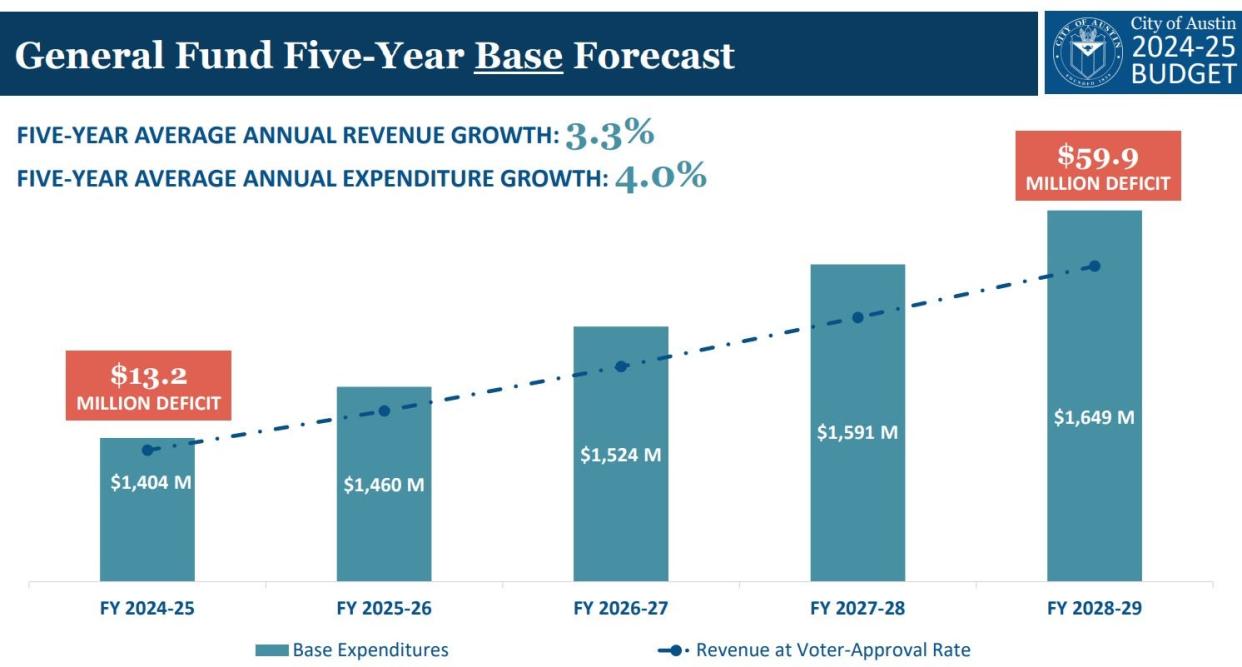City Hall Insider: How Austin plans to tackle projected budget deficits, Marshalling Yard shelter

Editor's note: City Hall Insider is a roundup of items the Austin City Council is set to vote on, other local government news and an inside look at the reporting process. This story will be updated after the Austin City Council votes.
I was recently thinking about one of the first stories I was assigned in journalism school. It was nearing July 4 weekend, and my editor told me I was going to write about gas prices.
Determined to impress my new editor, I spent a ridiculous amount of time crafting a lede that I, at that time, was very proud of. Something to the tune of: Fireworks aren't the only thing skyrocketing this weekend, gas prices are expected to reach their highest July 4 weekend rates since 2014. (It's terrible, I know).
It's safe to say my editor did not feel as strongly about the lede as I did and immediately cut and replaced it with something much more straightforward, and she was 100% correct in doing so. That same editor, who grew to become one of my closest mentors, taught me that sometimes less is more.
Sometimes you don't need an extra-wordy sentence or snappy lede, you just need to show why and how something will impact people.
I thought a lot about that this week coming out of the city's financial forecast meeting. There was so much data, so many numbers that to an onlooker could make no sense whatsoever, and I could feel a readers eyes glaze over trying to take in all the information.
So, rather than try to explain the specific ins and outs of the precarious financial situation the city is likely to be in over the next few years, I tried my best to paint the bigger picture of the issue and what this could mean for Austin residents.
I'll also break down some of the other big ticket items the Austin City Council will be voting on today.
Let's get into it.
Austin has a money problem
The bottom line is: money is going to be getting tight at the city of Austin over the next few years.
Sales tax revenue is falling short of projections after a post-social distancing spending surge; a state-imposed property tax rate cap hinders the city's ability to adopt an annual rate 3.5% greater that the previous year without first asking for voter approval; and one-time federal funding like American Rescue Plan Act (ARPA) dollars will dry up over the next few years.
The city is looking at a structural imbalance in its general fund budget, which means its expenses are projected to exceed revenues.
General fund expenses cover everything from employee salaries and benefits increases — which city staff members on Tuesday projected would be a large cost driver — to money for several departments such as police and fire.
For the current fiscal year, which began Oct. 1 and ends Sept. 30, the city estimates it will receive $1.4 billion in general fund revenue but come in $3.8 million below what was projected. While this isn't ideal for the city, it is a small fraction of a growing deficit officials are projecting over the next five years.

The city's general fund deficit will increase four fold from next year's budget to fiscal year 2028-29, coming in at $59.9 million in the red that year, according to city staff projections.
Property taxes are critical for the general fund, expected to account for 47.2% of the general fund's revenue this fiscal year, according to city projections. Sales taxes come in second, estimated to account for 26.6% of general fund revenue this year.
While the city will look for cost-cutting and revenue generating measures in the short term, Kerri Lang with the city's financial office said Tuesday there will likely need to be further conversations with the City Council about periodic tax rate elections, which would allow the city to adopt rates higher than the state limit and could help offset costs if approved.
All of these changes will rest on the shoulders of Austin's next city manager who will start in early May, just a few months before the City Council will vote on next fiscal year's budget.
Marshalling Yard extension
The city is hoping to extend operations of the Marshalling Yard, a warehouse the city converted into a homeless shelter last year.
Initially slated to be open until July 1, city staff is asking the City Council to approve $1 million in ARPA funds to keep the shelter open until March 2025. The shelter is owned by the city and operated by the nonprofit Endeavors.
In February, residents of the Marshalling Yard voiced concerns about the shelter's living conditions, complaining about a lack of nutritious meals and unsanitary state.
David Gray, Austin's homeless strategy officer, following that meeting said that he took those concerns seriously but disputed claims of uncleanliness.
In March, the city announced it was partnering with the Central Texas Food bank to provide healthier meals at the Marshalling Yard.
Airport expansion project funding
The City Council will vote on a $162 million design-build contract with JE Dunn Construction Company for a new central utility plant facility to support the expansion of the Austin-Bergstrom International Airport.
Read More: Austin airport kicks off construction of $164 million, 3-gate expansion
"It will utilize current efficiency technology, equipment, and operational processes to provide reliable, redundant, and resilient service for the existing and future cooling and heating loads," city documents state.
The current heating and cooling plant is not big enough to meet the expected load that will come with the expansion and equipment cannot be added to the current building, according to city documents.
My colleague, American-Statesman transportation reporter Chase Rogers, will have more on this after the vote.
If you've made it this far, thank you for following along! I hope you'll continue reading "City Hall Insider," published the day of every Austin City Council meeting, which is usually bi-weekly. In the meantime, I will continue my coverage of local government and politics. To share additional tips or insight, email me at emccarthy@statesman.com. You can also find me on X, formerly Twitter, @byEllaMcCarthy.
This article originally appeared on Austin American-Statesman: Austin, Texas: budget deficit, Marshalling Yard extension & more
